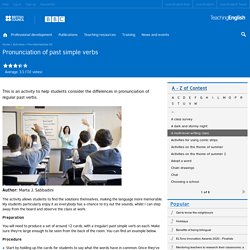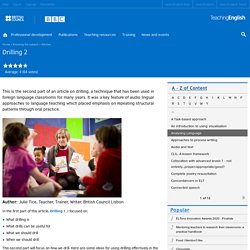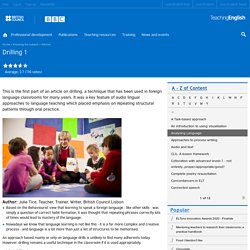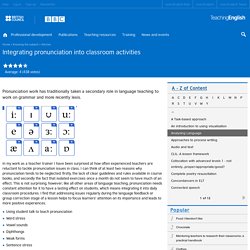

BBC Learning English. PlayPhrase.me: Site for cinema archaeologists. Improve your English pronunciation using YouTube. Ship or Sheep : minimal pair ESL pronunciation practice - free online. BBC Learning English - Pronunciation. Forvo: the pronunciation dictionary. All the words in the world pronounced by native speakers. Teaching English Pronunciation Skills. Word Stress Exercise. Interactive Phonemic Chart: The 44 sounds & symbols of English. Pronunciation articles. Phonemic chart. Pronunciation of past simple verbs.
The activity allows students to find the solutions themselves, making the language more memorable.

My students particularly enjoy it as everybody has a chance to try out the sounds, whilst I can step away from the board and observe the class at work. Preparation You will need to produce a set of around 12 cards, with a (regular) past simple verb on each. Make sure they're large enough to be seen from the back of the room.
You can find an example below. Procedure Start by holding up the cards for students to say what the words have in common. Drilling 2. In the first part of this article, Drilling 1, I focused on: What drilling isWhat drills can be useful forWhat we should drillWhen we should drill This second part will focus on how we drill.

Here are some ideas for using drilling effectively in the classroom. Repetition drillsGuessing gamesDisappearing textDialogue buildingMingle activitiesInformation gapsSongs, rhymes and chantsConclusion Repetition drillsWhen learners are getting used to the sounds of English it may be easier for them not to see the language written down before they practise saying it, so get them to listen to your model and then repeat. Make sure you give clear, natural sounding and consistent models.Use hand movements to indicate intonation, use your fist to beat the stress, and join or separate fingers to show word boundaries and where linking occurs in phrases. You can vary the drill in terms of who repeats - whole class, half the class, boys only, girls only, individuals.
Write up the text on the board. Example: Drilling 1. Based on the Behaviourist view that learning to speak a foreign language - like other skills - was simply a question of correct habit formation, it was thought that repeating phrases correctly lots of times would lead to mastery of the language.Nowadays we know that language learning is not like this - it is a far more complex and creative process - and language is a lot more than just a list of structures to be memorised.

An approach based mainly or only on language drills is unlikely to find many adherents today. However, drilling remains a useful technique in the classroom if it is used appropriately. What drilling isWhat drills can be useful forWhat we should drillWhen we should drill What drilling is At its simplest, drilling means listening to a model, provided by the teacher, or a tape or another student, and repeating what is heard.
This is a repetition drill, a technique that is still used by many teachers when introducing new language items to their students. Magic E Words - Sight Words, Reading, Writing, Spelling & Worksheets. Magic E Rule: The magic E rule states when the letter “e” sits at the end of the word, it is usually silent and the “magical” E tells the first vowel or the preceding vowel to say its name or long sound.

The magic e vowels are as follows: a_e, i_e, o_e and u_e. Integrating pronunciation into classroom activities. In my work as a teacher trainer I have been surprised at how often experienced teachers are reluctant to tackle pronunciation issues in class.

I can think of at least two reasons why pronunciation tends to be neglected: firstly, the lack of clear guidelines and rules available in course books, and secondly the fact that isolated exercises once a month do not seem to have much of an effect. This is not surprising, however; like all other areas of language teaching, pronunciation needs constant attention for it to have a lasting effect on students, which means integrating it into daily classroom procedures. I find that addressing issues regularly during the language feedback or group correction stage of a lesson helps to focus learners' attention on its importance and leads to more positive experiences. Using student talk to teach pronunciationWord stressVowel soundsDiphthongsWeak formsSentence stressConclusion.